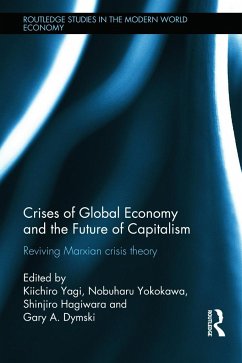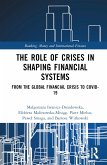Crises of Global Economy and the Future of Capitalism
An Insight into the Marx's Crisis Theory
Herausgeber: Yagi, Kiichiro; Shinjiro, Hagiwara; Yokokawa, Nobuharu
Crises of Global Economy and the Future of Capitalism
An Insight into the Marx's Crisis Theory
Herausgeber: Yagi, Kiichiro; Shinjiro, Hagiwara; Yokokawa, Nobuharu
- Gebundenes Buch
- Merkliste
- Auf die Merkliste
- Bewerten Bewerten
- Teilen
- Produkt teilen
- Produkterinnerung
- Produkterinnerung
Recent events in the global financial markets and macro economies have served as a strong reminder for a need of a coherent theory of capitalist crisis and analysis. This book helps to fill the gap with well-grounded alternative articulations of the forces which move today's economic dynamics, how they interact and how ideas of foundational figures in economic theory can be used to make sense of the current predicament. The book presents a comprehensive collection of reflections on the origins, dynamics and implications of the interlinked crises of the U.S. and global economies.
Andere Kunden interessierten sich auch für
![The Role of Crises in Shaping Financial Systems The Role of Crises in Shaping Financial Systems]() Malgorzata Iwanicz-DrozdowskaThe Role of Crises in Shaping Financial Systems153,99 €
Malgorzata Iwanicz-DrozdowskaThe Role of Crises in Shaping Financial Systems153,99 €![A Tale of Two Crises A Tale of Two Crises]() A Tale of Two Crises189,99 €
A Tale of Two Crises189,99 €![Consuls and the Institutions of Global Capitalism, 1783-1914 Consuls and the Institutions of Global Capitalism, 1783-1914]() Ferry De GoeyConsuls and the Institutions of Global Capitalism, 1783-1914190,99 €
Ferry De GoeyConsuls and the Institutions of Global Capitalism, 1783-1914190,99 €![The Strategy of Global Branding and Brand Equity The Strategy of Global Branding and Brand Equity]() Alvin LeeThe Strategy of Global Branding and Brand Equity200,99 €
Alvin LeeThe Strategy of Global Branding and Brand Equity200,99 €![The efficiency of early warning indicators for financial crises The efficiency of early warning indicators for financial crises]() Jens Michael RabeThe efficiency of early warning indicators for financial crises48,00 €
Jens Michael RabeThe efficiency of early warning indicators for financial crises48,00 €![Fixing Financial Crises in the Twenty-First Century Fixing Financial Crises in the Twenty-First Century]() Andrew Haldane (ed.)Fixing Financial Crises in the Twenty-First Century181,99 €
Andrew Haldane (ed.)Fixing Financial Crises in the Twenty-First Century181,99 €![Nine Crises Nine Crises]() William KeeganNine Crises23,99 €
William KeeganNine Crises23,99 €-
-
-
Recent events in the global financial markets and macro economies have served as a strong reminder for a need of a coherent theory of capitalist crisis and analysis. This book helps to fill the gap with well-grounded alternative articulations of the forces which move today's economic dynamics, how they interact and how ideas of foundational figures in economic theory can be used to make sense of the current predicament. The book presents a comprehensive collection of reflections on the origins, dynamics and implications of the interlinked crises of the U.S. and global economies.
Produktdetails
- Produktdetails
- Verlag: Routledge
- Seitenzahl: 354
- Erscheinungstermin: 10. Dezember 2012
- Englisch
- Abmessung: 240mm x 161mm x 24mm
- Gewicht: 696g
- ISBN-13: 9780415687331
- ISBN-10: 0415687330
- Artikelnr.: 33382037
- Herstellerkennzeichnung
- Libri GmbH
- Europaallee 1
- 36244 Bad Hersfeld
- gpsr@libri.de
- Verlag: Routledge
- Seitenzahl: 354
- Erscheinungstermin: 10. Dezember 2012
- Englisch
- Abmessung: 240mm x 161mm x 24mm
- Gewicht: 696g
- ISBN-13: 9780415687331
- ISBN-10: 0415687330
- Artikelnr.: 33382037
- Herstellerkennzeichnung
- Libri GmbH
- Europaallee 1
- 36244 Bad Hersfeld
- gpsr@libri.de
Kiichiro Yagi is Vice President and Professor in Economics at Setsunan University, Japan. He was educated in the University of Tokyo and Nagoya University. He received his Ph. D. from Kyoto University. He taught political economy and history of economics at Kyoto University for a quarter of century. Since the mid of nineteen-nineties he made efforts to integrate the ideas of evolutionary and institutional economics with classical political economy including Marxian economics. He is Chief Representative of the JSPE. Nobuharu Yokokawa is Professor of Economics at Musashi University, Tokyo Japan. He was educated at Shiga University (BA), the University of Tokyo (MSc) and Cambridge University (PhD). His publications include Value, Employment and Crisis (in Japanese, Shakai Hyouron Sya). He had co-edited Capitalism in Evolution (Edward Elgar), Industrialization of China and India and its Impact on World Economy (Routledge, forthcoming). Since 2007 he has been editor of the Uno Theory Newsletter. He is chairman of the JSPE Committee for International Communication and Exchange Shinjiro Hagiwara is Professor of Economics at Yokohama National University, Japan. He was educated at Fukushima University and at the University of Tokyo. His publications include US Multinationals in the World Economy (Ohtsuki 2005 in Japanese) and The Rise and Demise of the Keynesian Coalition (Yuhikaku 1996 in Japanese). He is a member of the executive board of the JSPE. Gary Dymski is Chair in Applied Economics at the Leeds University Business School, University of Leeds, and is on leave as Professor of Economics at the University of California, Riverside. He received his BA in urban studies from the University of Pennsylvania, graduating Phi Beta Kappa in 1975. He received a doctorate in economics from the University of Massachusetts, Amherst in 1987. He has published books, articles, chapters, and studies on banking, financial fragility, urban development, credit-market discrimination, the Latin American and Asian financial crises, exploitation, housing finance, the subprime lending crisis, financial regulation, the Eurozone crisis, and economic policy. He is an academic adviser of the JSPE.
Introduction
Nobuharu Yokokawa and Gary Dymski 1. From the Subprime to the Great Earthquake Crisis in Japan
Makotoh Itoh 2. The Global Financial Crisis: The Instability of U.S.-Centered Global Capitalism
Tetsuji Kawamura 3. Financialization and Capitalist Accumulation: A Structural Account of the Crisis of 2007-2009
Costas Lapavitsas 4. The Global Financial Crisis as a World Great Depression: An Analysis Using Marxian Economics
Masayoshi Tatebe 5. The Demise of the Keynesian Regime
Financial Crisis
and Marx's Theory
Shinjiro Hagiwara 6. The 2008 Economic Crisis from the Perspective of Changes in Prices Movements
Akira Matsumoto 7. Cyclical Crisis
Structural Crisis
Systemic Crisis
and Future of Capitalism
Nobuharu Yokokawa 8. Financial Innovations
Growth and Crisis: the Subprime Collapse in Perspective
Robert Boyer 9. The Crisis of 2008 and the Dynamics of Capitalism in Time and Space
Toshio Yamada 10. Neoliberalism and its Crisis
Gerard Dumenil and Dominique Levy 11. Fiat Money and How to Combat Debt Deflation
Thomas Sekine 12. Can the US Economy Escape the Law of Gravity? A Minsky-Kalecki Approach to the Crisis of Neoliberalism
Gary A. Dymski 13. The Political Economy of Global Imbalances and the Global Financial Crisis
Kang-Kook Lee 14. East Asia's Integration and Structural Shift:The Shift from Newly Industrializing Economies to Potentially Bigger Market Economies under the Global Economy
Hitoshi Hirakawa 15. Financialization
Structural Change
and Employment in the U.S. and Japan
James Heintz 16. Overconsumption
Household Debt
and Dollar-Privilege: The Causes of the US Subprime Crisis
Aki Aneha
Nobuharu Yokokawa and Gary Dymski 1. From the Subprime to the Great Earthquake Crisis in Japan
Makotoh Itoh 2. The Global Financial Crisis: The Instability of U.S.-Centered Global Capitalism
Tetsuji Kawamura 3. Financialization and Capitalist Accumulation: A Structural Account of the Crisis of 2007-2009
Costas Lapavitsas 4. The Global Financial Crisis as a World Great Depression: An Analysis Using Marxian Economics
Masayoshi Tatebe 5. The Demise of the Keynesian Regime
Financial Crisis
and Marx's Theory
Shinjiro Hagiwara 6. The 2008 Economic Crisis from the Perspective of Changes in Prices Movements
Akira Matsumoto 7. Cyclical Crisis
Structural Crisis
Systemic Crisis
and Future of Capitalism
Nobuharu Yokokawa 8. Financial Innovations
Growth and Crisis: the Subprime Collapse in Perspective
Robert Boyer 9. The Crisis of 2008 and the Dynamics of Capitalism in Time and Space
Toshio Yamada 10. Neoliberalism and its Crisis
Gerard Dumenil and Dominique Levy 11. Fiat Money and How to Combat Debt Deflation
Thomas Sekine 12. Can the US Economy Escape the Law of Gravity? A Minsky-Kalecki Approach to the Crisis of Neoliberalism
Gary A. Dymski 13. The Political Economy of Global Imbalances and the Global Financial Crisis
Kang-Kook Lee 14. East Asia's Integration and Structural Shift:The Shift from Newly Industrializing Economies to Potentially Bigger Market Economies under the Global Economy
Hitoshi Hirakawa 15. Financialization
Structural Change
and Employment in the U.S. and Japan
James Heintz 16. Overconsumption
Household Debt
and Dollar-Privilege: The Causes of the US Subprime Crisis
Aki Aneha
Introduction
Nobuharu Yokokawa and Gary Dymski 1. From the Subprime to the Great Earthquake Crisis in Japan
Makotoh Itoh 2. The Global Financial Crisis: The Instability of U.S.-Centered Global Capitalism
Tetsuji Kawamura 3. Financialization and Capitalist Accumulation: A Structural Account of the Crisis of 2007-2009
Costas Lapavitsas 4. The Global Financial Crisis as a World Great Depression: An Analysis Using Marxian Economics
Masayoshi Tatebe 5. The Demise of the Keynesian Regime
Financial Crisis
and Marx's Theory
Shinjiro Hagiwara 6. The 2008 Economic Crisis from the Perspective of Changes in Prices Movements
Akira Matsumoto 7. Cyclical Crisis
Structural Crisis
Systemic Crisis
and Future of Capitalism
Nobuharu Yokokawa 8. Financial Innovations
Growth and Crisis: the Subprime Collapse in Perspective
Robert Boyer 9. The Crisis of 2008 and the Dynamics of Capitalism in Time and Space
Toshio Yamada 10. Neoliberalism and its Crisis
Gerard Dumenil and Dominique Levy 11. Fiat Money and How to Combat Debt Deflation
Thomas Sekine 12. Can the US Economy Escape the Law of Gravity? A Minsky-Kalecki Approach to the Crisis of Neoliberalism
Gary A. Dymski 13. The Political Economy of Global Imbalances and the Global Financial Crisis
Kang-Kook Lee 14. East Asia's Integration and Structural Shift:The Shift from Newly Industrializing Economies to Potentially Bigger Market Economies under the Global Economy
Hitoshi Hirakawa 15. Financialization
Structural Change
and Employment in the U.S. and Japan
James Heintz 16. Overconsumption
Household Debt
and Dollar-Privilege: The Causes of the US Subprime Crisis
Aki Aneha
Nobuharu Yokokawa and Gary Dymski 1. From the Subprime to the Great Earthquake Crisis in Japan
Makotoh Itoh 2. The Global Financial Crisis: The Instability of U.S.-Centered Global Capitalism
Tetsuji Kawamura 3. Financialization and Capitalist Accumulation: A Structural Account of the Crisis of 2007-2009
Costas Lapavitsas 4. The Global Financial Crisis as a World Great Depression: An Analysis Using Marxian Economics
Masayoshi Tatebe 5. The Demise of the Keynesian Regime
Financial Crisis
and Marx's Theory
Shinjiro Hagiwara 6. The 2008 Economic Crisis from the Perspective of Changes in Prices Movements
Akira Matsumoto 7. Cyclical Crisis
Structural Crisis
Systemic Crisis
and Future of Capitalism
Nobuharu Yokokawa 8. Financial Innovations
Growth and Crisis: the Subprime Collapse in Perspective
Robert Boyer 9. The Crisis of 2008 and the Dynamics of Capitalism in Time and Space
Toshio Yamada 10. Neoliberalism and its Crisis
Gerard Dumenil and Dominique Levy 11. Fiat Money and How to Combat Debt Deflation
Thomas Sekine 12. Can the US Economy Escape the Law of Gravity? A Minsky-Kalecki Approach to the Crisis of Neoliberalism
Gary A. Dymski 13. The Political Economy of Global Imbalances and the Global Financial Crisis
Kang-Kook Lee 14. East Asia's Integration and Structural Shift:The Shift from Newly Industrializing Economies to Potentially Bigger Market Economies under the Global Economy
Hitoshi Hirakawa 15. Financialization
Structural Change
and Employment in the U.S. and Japan
James Heintz 16. Overconsumption
Household Debt
and Dollar-Privilege: The Causes of the US Subprime Crisis
Aki Aneha









